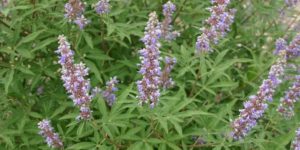Vitex agnus-castus tree is a shrub that is native to the Mediterranean and Central Asia. The shrub has long, finger-shaped leaves, blue-violet flowers, and dark purple berries. The fruit and seed are used to make medicine.
Contents
Uses
Vitex agnus-castus is taken by mouth for menstrual cycle irregularities, premenstrual syndrome (PMS), a more severe form of PMS called premenstrual dysphoric disorder (PMDD), and symptoms of menopause. It is also used for treating “lumpy” (fibrocystic) breasts, female infertility, preventing miscarriage in women with low levels of a hormone called progesterone, controlling bleeding and helping the body force out the placenta after childbirth, and increasing breast milk.
Benefits
Premenstrual Syndrome
According to the University of Maryland Medical Center, about 75 percent of women suffer symptoms of PMS, including backaches, cramps, poor concentration and fatigue. Vitex may help manage these symptoms and also restore menstrual regularity. At least one study suggests vitex can be helpful to treat PMS-induced migraines. Published in a 2013 issue of “Acta Neurologica Belgica,” the study followed 100 women using 40 milligrams of vitex daily for three months for their migraines. Forty-two percent of participants had a lessening in severity, duration and frequency of migraines.
Fertility Enhancement
Vitex is often used to enhance fertility, especially in women who don’t ovulate regularly. Vitex may help the body regulate estrogen, which is necessary in the first half of the cycle for ovulation, and progesterone, which helps maintain a pregnancy. One small study seems to support these claims. Published in a 2000 edition of “Research in Complementary and Natural Classical Medicine,” the study revealed 38 of 67 participating women got pregnant while using a homeopathic preparation containing vitex, and the women with light or irregular periods also had a measurable increase in progesterone production.
Pregnancy and Precautions
According to Red Moon Herbs, using vitex through the first trimester will reduce the chance of miscarrying. The National Center for Complementary and Alternative Medicine, however, advises avoiding vitex during pregnancy because of its hormone-altering effects. Effects on animals may be different from humans, but caution is warranted when considering a study in a 2012 issue of “Ciência Animal Brasileira” that determined an alcohol-based extract of vitex caused low weights in rat fetuses and placentas. Vitex can reduce the effectiveness of birth control pills and negatively interact with dopamine-boosting drugs.
Cautions
None are known.
Other Names
Agni Casti, Agnocasto, Agnolyt, Agnus-Castus, Chaste Berry, Agneau du Moine, Agneau-chaste, Agni Casti, Agnocasto, Agnolyt, Agnus-Castus, Arbre au Poivre, Chaste Berry, Chaste Tree, Chaste Tree Berry, Chasteberry, Chastetree, Chinese Vitex, Gattilier, Hemp Tree, Herbe au Poivre, Mang Jing Zi, Monk’s Pepper, Petit Poivre, Pimiento del Monje, Poivre de Moine, Poivre Sauvage, Vitex, Vitex Agnus Castus, Vitex rotundifolia, Vitex trifolia, Viticis Fructus
References
Source: WebMD, http://www.webmd.com/vitamins-supplements/ingredientmono-968-vitex%20agnus-castus.aspx?activeingredientid=968&
LiveStrong, http://www.livestrong.com/article/95347-vitex-benefits/
Image Source: http://www.herbwisdom.com

